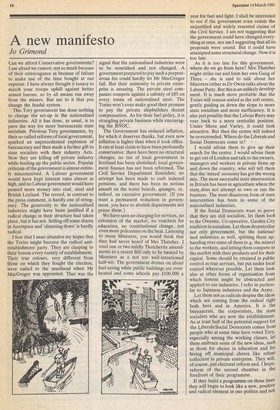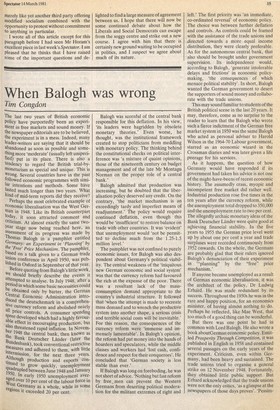A new manifesto
Jo Grimond
Can we afford Conservative governments? I am afraid we cannot; not so much because of their extravagance as because of failure to make use of the time bought at our expense. I have always thought it lunacy to march your troops uphill against better armed barons, so by all means run away from the miners. But see to it that you change the feudal system.
This Tory government has done nothing to change the set-up in the nationalised industries. All it has done, as usual, is to pave the way for more bureaucratic state socialism. Previous Tory governments, by their so-called reforms of local government, sparked an unprecedented explosion of bureaucracy and then made a further gift to state socialists with their industry Acts. Now they are killing off private industry while feeding up the public sector. Popular criticism of the government is almost entirely misconceived. A Labour government would have kept interest rates almost as high, and no Labour government would have poured more money into coal, steel and British Leyland. The record, in contrast to the press comment, is hardly one of stringency. The generosity to the nationalised industries might have been justified if a radical change in their structure had taken place, but it has not. Selling off some shares in Aerospace and 'slimming down' is hardly radical.
I fear that I must abandon my hopes that the Tories might become the radical antiestablishment party. They are clasping to their bosom every variety of establishment. Their true colours, very different from those on which they fought the election, were nailed to the masthead when Mr MacGregor was appointed. That was the signal that the nationalised industries were to be nourished and not changed. A government prepared to pay such a preposterous fee could hardly let Mr MacGregor fail. But their animosity to private enterprise is amazing. The private steel companies compete against a subsidy of £85 on every tonne of nationalised steel. The Tories won't even make good their promise to pay the private shipbuilders decent compensation. As for their fuel policy, it is strangling private business while encouraging the BNOC.
The Government has reduced inflation, for which it deserves thanks, but even now inflation is higher than when it took office. It can at least claim to have been profoundly conservative; there have been no structural changes; no tier of local government in Scotland has been abolished; local government finance has not been reformed. The Civil Service Department flourishes; no attempt has been made to curb indexed pensions, and there has been no serious assault on the water boards, quangos, or, indeed, on excessive government. (If you want a permanent reduction in government, you have to abolish departments not prune them.) We have seen no charging for services, no extension of the market, no vouchers for education, no constitutional change, , not even more policemen on the beat. Listening to many Ministers, you would think that they had never heard of Mrs Thatcher. I tried one or two mildly Thatcherite amendments to a recent Bill only to be treated by Ministers as a not too well-intentioned half-wit. The government drones on about fuel saving while public buildings are overheated and some schools pay £100,000 a year for fuel and light. I shall be interested to see if the government even resists the unjustified and widely resented claims of the Civil Service. I am not suggesting that the government could have changed everything at once, nor am I suggesting that all its proposals were sound. But it could have attempted some structural change. Now it is too late.
As it is too late for this government, where do we go from here? Mrs Thatcher might strike out and form her own Gang of Three — she is said to talk about her Ministers rather as Dr Owen talks about the Labour Party, But this is an unlikely development. It is much more probable that the Tories will remain united as the soft centre, gently guiding us down the slope to more state socialism and more inefficiency. It is also just possible that the Labour Party may veer back to a more centralist position. Under Shore and Varley, it could look attractive. But then the centre will indeed be overcrowded. Where do the Liberals and Social Democrats come in? - I would advise them to give up their search for the centre. I would advise them to get out of London and talk to the owners, managers and workers in private firms up and down the country, who will tell them that the 'mixed' economy has got the wrong mix. The most successful state intervention in Britain has been in agriculture where the state does not attempt to own or run the business. The most disastrous form of state intervention has been in some of the nationalised industries.
If the Social Democrats want to prove that they are still socialists, let them look to the Owenite, Co-operative, Garden City tradition in socialism. Let them decentralise not only government, but the nationalised industries as well, splitting them up, handing over some of them (e.g. the mines) to the workers, and letting them compete in the market with their products and for their capital. Some should be retained in public control as true services, but put under local control wherever possible. Let them look also at other forms of organisation from which lessons might be abstracted and applied to our industries; I refer in particular to Japanese industries and the Army.
Let them not as radicals despise the ideas which are coming from the radical right both here and in America. It is the bureaucrats, the corporatists, the state socialists who are now the establishment. As at least half of the potential support for the Liberals/Social Democrats comes from people who at some time have voted Tory, especially among the working classes, let them embrace some of the new ideas, such as those for choice in education and for hiving off municipal chores like refuse "collection to private enterprise. They will, of course, put electoral reform and, I hope, reform of the second chamber in the forefront of their programme.
If they build a programme on these lines they will begin to look like a new, positive and radical element in our politics and not merely like yet another third party offering modified socialism combined with the Opportunity to protest without commitment to anything in particular.
I wrote all of this article except for this Paragraph before I had seen Mr Horam's excellent piece in last week's Spectator. 1 am pleased that he thinks that I have raised some of the important questions and de lighted to find a large measure of agreement between us. I hope that there will now be some continued debate about how the Liberals and Social Democrats can escape from the soggy centre and strike out a new course. I agree with him that there is certainly new ground waiting to be occupied in politics, and I suspect we agree about much of its nature.







































 Previous page
Previous page